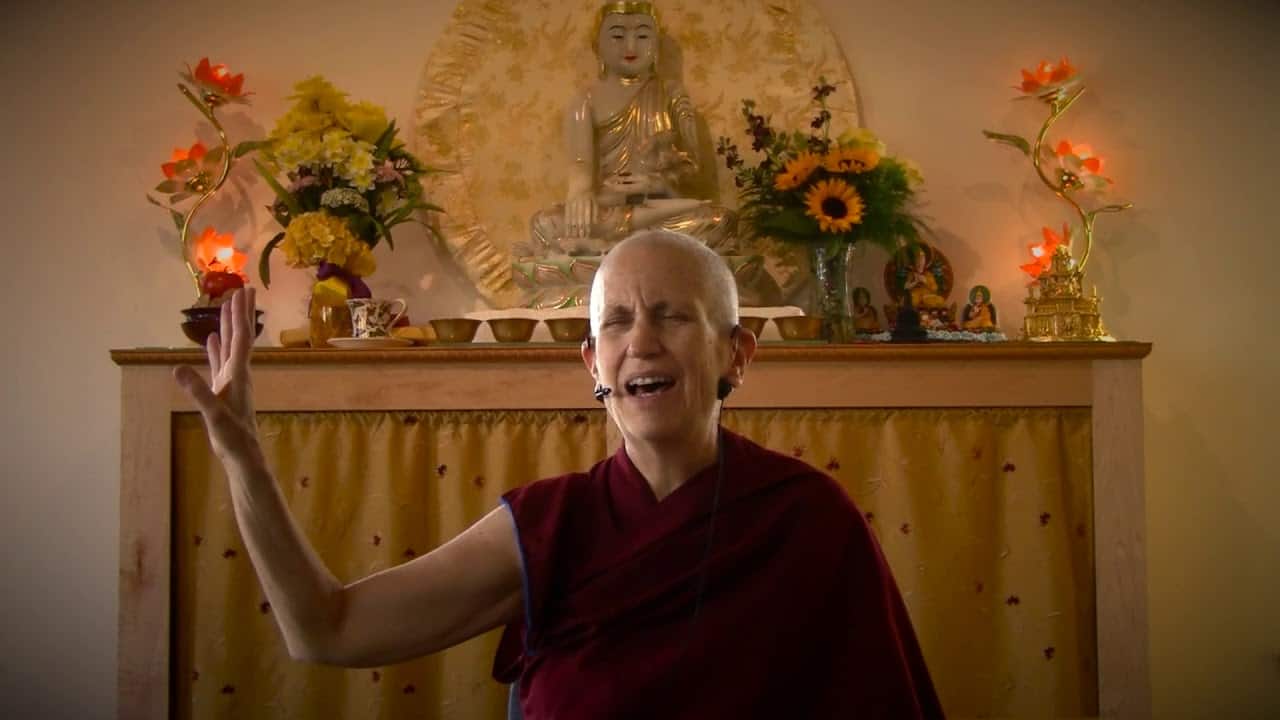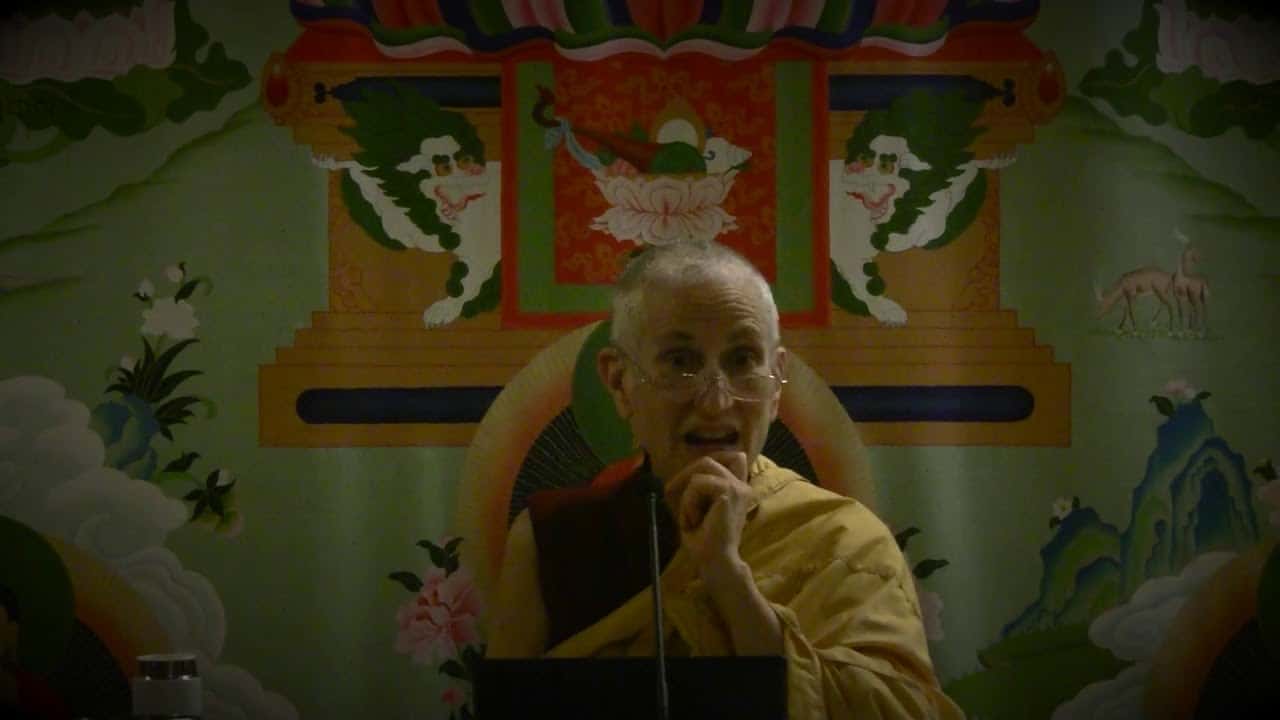The practice of confession
Part of a series of short talks given in preparation for the Amitabha Winter Retreat at Sravasti Abbey in 2017.
- Purifying negativities
- Psychologically making peace with our past
- An overview of the four opponent powers
To continue with the seven-limb prayer, the third one is confession. Actually, I’ve discovered that “repentance” is a better translation, because repentance includes confession plus making amends. Just confession isn’t actual purification. We have to make the amends, too. Apparently, when I looked up “repent,” which is not a word I really like, in the dictionary it had the meaning we wanted. If anybody can find a better word than “repent” please tell me.
The idea of this third branch is to purify negativities. That’s really important because our minds are covered over not only by the afflictions but also by the seeds of actions that we’ve done in the past, so the destructive actions can ripen and create impediments in our practice like sickness or inability to meet teachers or difficulty understanding the Dharma, falling asleep during teachings, things like that. They create obstacles in our practice and really prevent us from understanding what the Buddha is saying and making progress on the path. So this whole thing of purification is quite important.
I think psychologically, also, it’s very important because it allows us to make peace with our past. When we look back and we’ve done negative actions, one thing is we may not feel so good about what we’ve done in the past. Having that sense of guilt or heaviness really weighs us down and impedes us from practicing the Dharma and builds a lot of negative self-worth: “Oh, look at the things I did in the past, I was so awful…” And then we demean ourselves. That’s not very effective spiritually or psychologically.
Purification really helps us to admit and acknowledge and make amends for things that we’ve done in the past that we now wish that we hadn’t done and that we don’t want to experience the karmic results of.
Also, purification works because sometimes we think, “Oh, I acted negatively, or I have these negative emotions because of what other people did. So we don’t make peace with what other people did. But I think, actually, what I’m discovering more and more, is we’re not making peace with our personal response to what other people did. Because we can’t change what other people did to us or around us, or whatever, but often we respond with a very afflictive state of mind and create destructive karma in response to that, and then we stay stuck in whatever afflictive emotion that we had, not thinking that we have to purify it because it’s more “this person did that to me so they need to purify what they did to me,” but actually we need to purify our emotional response to what they did.
Are you getting what I’m saying? For example, if somebody… Like I keep telling you, the stupid thing with my second grade teacher who wouldn’t let me be in the class play. It’s a trivial thing, but it’s a good example. So here’s this situation. That situation is never going to change. I’m never going to be in second grade again. I’m never going to have the opportunity to be in that play. My teacher, Mrs D, she probably isn’t alive now, or if she is she’s not going to remember me. So that whole thing is over. There’s no way to change that situation. What I discovered in my Vajrasattva retreat years ago is I was still angry with her about that. What I can change is my anger towards her. I can’t change what she did. I may not have done anything, what I would consider unethical—I didn’t talk back to her, I didn’t do that stuff—but I’m still harboring malice about what happened in second grade. And harboring malice puts the seeds of negative karma on my mindstream. So I need to purify my response to what she did. Because that’s the only thing about the situation that I can ever change is my response to what somebody else did. I can never change what they did. But if I stay stuck in the response that I initially had—which may have been a very, very afflicted one, anger, resentment, who knows what it was—then my own mind is impeding itself. When I talk about making peace with the past it’s like looking at things that happened to us and practicing the Dharma, finding another way to see the situation. Like, “This is a result of my own negative karma, why am I getting mad at somebody else?” Or, “Look at me, I’m still mad about something that happened in 2nd grade….” Like, “Chodron, it’s time to put this down. Nobody else, amongst 7 billion human beings on this planet cares about your not being in the class play in second grade. Do you really have to make such a big deal about it in your life?” I talk to myself that way. Maybe for you that way of talking to yourself doesn’t work, but for me it works, and it’s like, yes, it’s time to forget about this, and forgive Mrs D., and wish her well, and have other memories of second grade besides this one. Because there were many happy things that happened in second grade, too. Why am I only remembering this one? That way I find when we use the Dharma it really purifies previous negativities and enables us to go forward with a much clearer, a much more peaceful mind.
Four opponent powers
The purification process itself has four opponent powers.
-
The first one is regret for whatever we did. Or maybe it’s regret for this afflictive emotion. Even though we didn’t act anything out there still might have been the nonvirtuous action of malice, which is a mental one. Or nonvirtuous mental action of coveting, or whatever it is. Having regret for what we did, and knowing that regret is not guilt. We’re not blaming ourselves. We’re not blaming anybody. We’re just realizing we made a mistake and owning that mistake. That’s all. “I did that. I’ve got to acknowledge it.” And all the other stuff that comes with guilt, like, “That means I’m a terrible person, and how can anybody ever love me, they never will love me, and I can’t let anybody else know this about me because then they’ll think what an awful person I am, and I’m so guilty, and I’m going to get punished, and even though I’m a Buddhist now I’m going to go to Christian hell….” We get totally confused. That’s not this first power. It’s simply regret. I like this example. When you have the stove with the electric coil, and you turn it off but the coil is still hot, you may accidentally touch the coil. You regret that, but you don’t feel guilty. That’s the difference between regret and guilt. “I touched that hot coil. Oops. Sorry I did.” “I did that negative action. Sorry I did.” it’s not, “Oh, I touched the coil. Oh look what a terrible person I am.” Etc. It doesn’t go into all of that guilt-tripping stuff.
-
The second one they call “reliance.” I call “restoring the relationship.” What it means is that whoever we acted in a destructive way towards we create a virtuous motivation and we restore the relationship, at least mentally, on our own side, so that we’re not holding a grudge, we’re not holding anything towards whoever it was that we harmed. Because it’s interesting: we harm somebody else, so you think we need to clean up our own act. But the way our mind works, we blame the other person. This is really restoring the relationship by creating a good intention. In the case of sentient beings, cultivating a bodhicitta motivation towards them. When we’ve done negativities in relationship to the Buddha, Dharma, and Sangha, to take refuge in them, and that acts as the second step.
-
The third one is making a determination not to do the action again. There are some things we can truthfully say, “I will never do that again,” because we’ve looked and no way do we want to do that again. There are other actions—like gossiping—that maybe we can’t truthfully say, “I’ll never do again.” Then you give yourself a set period of time and you really keep it very strictly in that set period of time. And then if you do well you can generate another…. So for the the next three days I’m not going to talk about other people behind their backs. You do it for three days, and then, “Oh, I did that pretty well, so another three days I’ll make that determination.”
-
Then the fourth of the four opponent powers is some kind of remedial behavior. This could be when we do the 35 Buddhas we’re reciting the buddhas’ names, we’re prostrating to them. Also making offerings to the Three Jewels. Doing volunteer work for some kind of charity, or doing volunteer work at the Dharma center or the monastery or the temple. Any kind of virtuous action can be the remedial behavior that we do. Sponsoring Dharma books for free distribution. There are so many things that you can do that are the remedial behavior.
Although we just say in the short seven-limb prayer, “I confess all my destructive actions created since beginningless time,” actually you could stop at that line and probably meditate for a few eons. Or at least a little bit more time.
We always confess and repent all of our negativities, but it’s also good to think of specific ones that we’ve done that really weigh on our minds, that we really don’t feel good about and focus on those too, because the four opponent powers really helps us just make peace with all of that, put it down.
We usually do purification practice every day because we also usually create destructive karma every day. It’s a good habit to get into. And even though we can’t remember what we’ve done in previous lives, they say we’ve done everything, so it’s always good to confess it. Don’t worry about, “Oh, I confessed something I didn’t do.” Because we don’t know what we’ve done in our previous lives, so we can’t know if we’ve really done that or not. But we certainly can make strong determinations not to do that kind of action again. And that’s very, very helpful to us.
You’ll notice when we’re talking about the conditions for being born in Sukhavati, that purification is one of them. So this third of the seven-limb prayer is specializing in that.
Venerable Thubten Chodron
Venerable Chodron emphasizes the practical application of Buddha’s teachings in our daily lives and is especially skilled at explaining them in ways easily understood and practiced by Westerners. She is well known for her warm, humorous, and lucid teachings. She was ordained as a Buddhist nun in 1977 by Kyabje Ling Rinpoche in Dharamsala, India, and in 1986 she received bhikshuni (full) ordination in Taiwan. Read her full bio.


